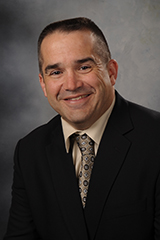April 10, 2018
Two Obstacles

One thing that I like about my job is being able to tell what I like about our profession, my colleagues, and K-State Research and Extension. Nevertheless, there are times, to use a referee’s and umpire’s old cliché, when I have to “Call ‘em like I see ‘em.”
Last week I unveiled the six strategic emphases we developed and will focus on to further evolve and improve our K-State Research and Extension system. I also stated that I would divulge two obstacles this week. I believe we have to address these obstacles to make K-State Research and Extension an even better Extension system.
The obstacles are:
1. A culture of sameness; and,
2. A grudge over grace mentality.
A culture of sameness means what it sounds like. From an overall perspective, we do not want our organization and our jobs to change. We prefer to do things as they have always been done. We want to keep doing the same types of programs, conduct them in the same ways, serve the same types of clientele, hire the same types of potential Extension professionals, and preserve the status quo as much as possible – even if it puts us at a disadvantage. Although we are agents of change and promote change among our clientele, we do not like change.
The 2014 Extension North Central Region Organizational Cultural Assessment conducted by our North Central Cooperative Extension Association indicated our dislike for change. As a region, we scored well below our private industry professional counterparts with regard to change acceptance, and, K-State Research and Extension scored lower than the North Central Region’s average.
To further demonstrate our lack of willingness to accept change, I can summarize several requests and recommendations I have had into the following statement: “I want you to fix _____ (an issue, thing or somebody). Just don’t change anything, especially my job.” Huh? To fix something, like making K-State Research and Extension even better, we have to be willing to accept needed change. Whether the change is small, medium, or even large, we at least need to be able to consider it if it enables us to better serve the peoples of Kansas.
I have also noticed that we tend to favor a grudge rather than grace mentality. Grudge mentalities hinder our ability to accept change. What do I mean by a grudge mentality? Grudge mentalities always look to problems from the past to cast a negative light on the future. I have heard people be untrusting of their leaders, colleagues, and partnering organizations for a decision, action, or inaction made in the near and even distant past. When statements like “We have tried that about ___ years ago, and it didn’t work.” are used, it is a grudge mentality. If you keep lamenting a condition that has been present for a long time, it is a grudge mentality. Grudges can even become multi-generational. I once had a board member tell me that they were still mad about a director who drew up districts on a map without local input. That event happened in the 1990’s. The board member in question would have been in either elementary or junior high school during that time.
I think it is time to bury the grudge mentality and adopt a grace mentality. We have all heard the phrase, forgive and forget. A grace mentality doesn’t necessarily mean that you forget about the past transgressions, but it does require you to forgive. History teaches us valuable lessons. With a grace mentality, instead of using a past event to block future ideas, you use it to build in safeguards to better ensure an idea succeeds in the future. A grace mentality means that you become more willing to judge new opportunities to work with people, partner with other organizations, and examine opportunities for change based on their potential merits for bettering our future. A grace mentality releases us from the burden of carrying big chips on our shoulders. A grace mentality permits you to be more positive about the past, present, and most of all, the future of K-State Research and Extension. A grace mentality allows us to enjoy our jobs, profession, colleagues, leaders and organization more.
As we look to the future of K-State Research and Extension, I ask that we begin by loosening the grips that the culture of sameness has on us. I further ask that we throw off the burden of carrying around the grudge mentality. In order to successfully position K-State Research and Extension to better address the needs of our current and future clientele, we need to remove these two shackles that hold us back from creating our better tomorrow.